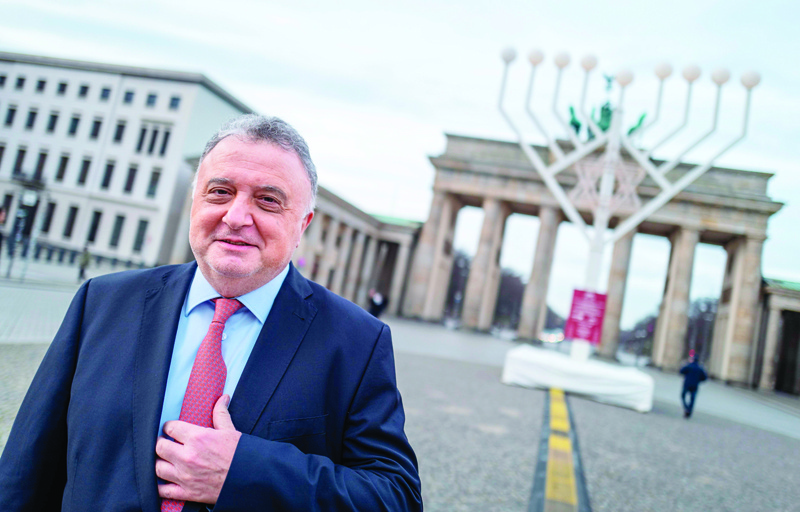
BERLIN: Israel welcomes a German push to expand the Iran nuclear deal into a broader security agreement once Joe Biden moves into the White House next month, its ambassador to Berlin said. Jeremy Issacharoff, the nation's envoy in Germany since 2017, said a recent call by German Foreign Minister Heiko Maas to reassess the 2015 nuclear accord with a new US administration was a "step in the right direction".
The 2015 nuclear deal-known formally as the Joint Comprehensive Plan of Action, or JCPOA-gave Iran relief from sanctions in return for curbs on its nuclear program. Maas told Der Spiegel magazine this month that the existing agreement, under massive pressure after repeated Iranian violations and Donald Trump's unilateral withdrawal in 2018, needed an overhaul.
The "nuclear agreement plus" envisaged by Maas would bar the development of nuclear weapons as well as place restrictions on Tehran's ballistic rocket program and interference in countries around the region. Biden has signaled that Washington could rejoin the deal as a starting point for follow-on negotiations if Iran returned to compliance. But Iran's Foreign Minister Mohammad Javad Zarif has rejected talk of reopening the accord struck five years ago after marathon talks involving the United States, Britain, China, France, Germany and Russia.
'Triangular' partnership
Issacharoff said the so-called 5+1 partners needed to take Iran's "destabilizing involvement" in countries including Syria, Lebanon, Yemen and Iraq into account in any further negotiations with Tehran. "I think people need to realize that you can't just turn the clock back to 2015," he said. "There's been a production of missiles and testing of missiles and these issues need to be addressed as well as the wholesale violations that Iran has carried out against the whole JCPOA agreement."
Issacharoff said he welcomed more active involvement of Germany in Middle East diplomacy and the now robust "strategic partnership" that had developed in the 70 years since the Holocaust. Anticipating a vast improvement in "tone" between Germany and the US with Biden at the helm, he said Israel would like to see more of "a triangular type of strategic partnership" with the two countries on Middle East security issues "which I think would be very good for all sides".
'The most important partnership'
He said it was Germany's firm commitment to atone for Nazi atrocities that had allowed relations with Israel to flourish since the countries officially established diplomatic relations in 1965. Issacharoff highlighted "moving" visits by German President Frank-Walter Steinmeier to both the Holocaust memorial Yad Vashem in Jerusalem and Auschwitz this year and joint military exercises in August between Israeli and German fighter pilots. "From defense issues to culture, people-to-people engagements, economy, cyber, intelligence-I can only see this as a partnership which is evolving and becoming one of, I'd say probably the most important partnership for Israel clearly in Europe but even in global terms."
Issacharoff said that as ties between Israel and four Arab nations-Morocco, the United Arab Emirates, Bahrain and Sudan-normalise in deals brokered by Donald Trump's administration, Germany had played a constructive role as well. Noting that Maas had hosted the first meeting between his Israeli and Emirati counterparts in October, Issacharoff called it "a very important step for Germany and a very important sign of its commitment to the process".
Trump warns Iran
In another development, US President Donald Trump warned Wednesday he would hold "Iran responsible" in the event of a fatal attack on Americans in Iraq, as the first anniversary of the killing of a top Iranian general in a US air strike approaches. "Our embassy in Baghdad got hit Sunday by several rockets," Trump said on Twitter, referring to an attack that caused damage but no deaths. "Guess where they came from: IRAN," he added. "Now we hear chatter of additional attacks against Americans in Iraq," he added, before offering "some friendly health advice to Iran: if one American is killed, I will hold Iran responsible. Think it over," he said.
Responding to Trump, the Iranian foreign minister Mohammad Javid Zarif tweeted on Thursday: "Putting your own citizens at risk abroad won't divert attention from catastrophic failures at home." He also attached an image of years-old Trump tweets that claimed ex-president Barack Obama would have started a war with Iran to win re-election, as well as a screengrab of a graph that purported to show the severity of the coronavirus pandemic in the US.
Secretary of State Mike Pompeo had already pointed the finger at Tehran, while the US military command that covers the region said that the rocket attack "was almost certainly conducted by an Iranian-backed rogue militia group." It said in a statement that while it "caused no US injuries or casualties, the attack did damage buildings in the US embassy compound, and was clearly NOT intended to avoid casualties."
"The United States will hold Iran accountable for the deaths of any Americans that result from the work of these Iranian-backed rogue militia groups," it added. Iran had earlier responded by calling on US authorities on Monday not to provoke "tensions". Trump ordered the drone attack on January 3, 2020 to kill the powerful Iranian general while he was in Baghdad. The air strike came after Iranian-backed militias had fired rockets at US targets in Iraq, in a scenario echoed by the latest strikes against the US embassy.
After Soleimani's killing, the entire region held its breath in anticipation of an uncontrolled escalation which ultimately did not materialize. But tensions are rising again as the first anniversary of the strike nears and the US leader-in his final weeks in office-is sticking to his "maximum pressure" approach toward the Iranian regime. Washington has recently reduced its diplomatic staff in the Iraqi capital amid speculations that it could close the mission altogether.- Agencies










